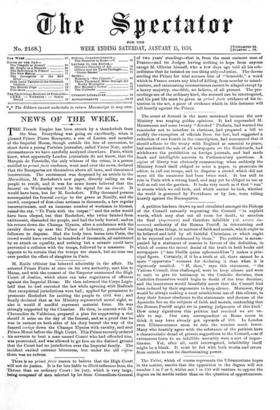A petition has been drawn up and circulated amongst the
Bishops of the Council earnestly requesting the Council " in explicit words, which may shut out all room for doubt, to sanction the final (supremam) and therefore infallible (ab errore im- munem) authority of the Roman Pontiff, in determining and teaching those things, in matters of faith and morals, which ought to be believed and held by all faithful Christians, or which ought to be rejected and condemned by them." The petition is accom- panied by a statement of reasons in favour of the definition, in which of course the recent denial of the truth in both books and newspapers (" tam libellis quam ephemeridibus") makes a prin- cipal figure. Certainly, if it be a truth at all, there cannot be a more " opportune" moment for declaring it than when it is vigorously assailed. " If, then," says this statement, " the Vatican Council, thus challenged, were to keep silence and were to omit to give its testimony to the Catholic doctrine, then Catholics themselves would begin to doubt of the true doctrine, and the innovators would boastfully assert that the Council had been induced by their arguments to keep silence. Moreover, they would be always making a most mischievous use of this silence, to deny their former obedience to the statements and decrees of the Apostolic See on the subjects of faith and morals, contending that the Roman Pontiff might err in passing judgments of this kind.' How many signatures this petition had received we are un- able to my. Our own correspondent at Rome seems to think it may have already got upwards of 400. In London even Ultramontanes seem to rate the number much lower. Many who heartily agree with the substance of the petition have a characteristic dread of private suggestions to the Council,—as if extraneous hints to an infallible assembly were a sort of imper- tinence. Yet, after all, until interrogated, infallibility itself might be a blank. It must be fed with both truths and errors from outside to test its discriminating power.






























